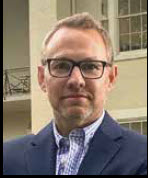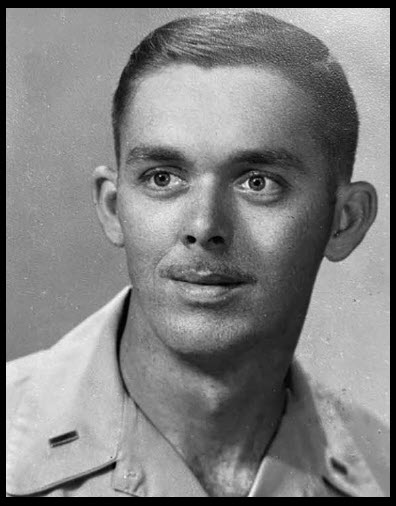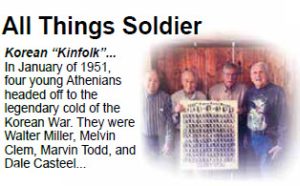 By: Kris Erskine
By: Kris Erskine
Among the manicured lawns and the gentle daily hum of suburban Athens, just a few miles or so from our courthouse square, is a man to whom this nation owes a debt of gratitude. A veteran. Athens is home to many such men and women. The stories of these veterans weave the tapestry of this nation, and of this community. These are stories of duty, sacrifice, and honor. And they walk among us. You can find them at Washington St. Diner on most mornings, or teaching our young people in local schools, and I even have a few in my classes every semester at the university. Among these narratives is the story of Colonel Robert Allen (Ret.), a figure whose commitment to service stood fast when it mattered.
Born at the outbreak of World War II, Allen grew up in an era of war: World War II, the Korean War, and the Cold War. For many young men like Allen, their duty to country weighed heavy. Allen responded to this weighty call in 1962, when he joined the Air Force. This was an era when Americans answered President Kennedy’s challenge, “Ask not what your country can do for you, but what you can do for your country.” During the height of tensions with Cuba, fraught with uncertainties, and no doubt with parents who worried for their son’s safety, the 21-year-old Robert Allen raised his hand and took the oath to protect the Constitution. As a boy he had witnessed the path the world was on, the danger ahead, and he joined the military anyway.
Allen began his career in the United States Air Force at Lackland Air Force Base, where he completed Basic Training. He was then shipped off to Biloxi, Mississippi, where he trained as an air traffic controller. Finally, in 1965, Allen was sent to Saigon for his first of three tours in Vietnam.
It was here, in Vietnam, that Allen experienced the war in a way only combat veterans know. Initially tasked with advising the Vietnamese Air Force in Saigon, he found himself in the middle of an escalating conflict and was sent into the Mekong Delta to advise the Vietnamese Air Force. Mr. Allen believes it was here in the Delta that he undertook the most important job of his twenty-four-year Air Force career.
In his oral history, Allen recalls, “I was a squadron commander in Vietnam. As a lieutenant, I was responsible for seventy-five or eighty-five men scattered all over the Mekong Delta. We were constantly under attack. I had to…give the men the confidence that we were doing the right thing.” Allen had to sit down with these young airmen – men not much younger than him – and mentor them about life, danger, and anything that would give the men the confidence they needed. But the things these young airmen saw would never leave them. Mr. Allen recalls that, “Once, we were in a control tower and we had a fighter jet coming and it was having trouble. There were two men on board.” The plane slid off the runway and flipped, and ended up in a pond. “You could see the men were buckled into their seats, upside down in a pond. We tried to turn the plane over, we tried to get the hatch open, but they both died. This is a memory that never leaves you.” In situations like this, Allen says that young seventeen- or eighteen-year-old kids – many of whom had never left their county and now found themselves halfway around the world – were afraid. Allen told them, “You aren’t the only one here that is afraid. Let’s take a deep breath.”
Allen bore the weight of leadership, guiding his men through the emotional turmoil of the conflict. For many young men in the military, witnessing the escalating war in Vietnam might be enough to call it quits after their tour. But Mr. Allen returned to the United States, remained in the Air Force, and earned a master’s degree in diplomatic history. After completing this degree, his trajectory had shifted and his days of air traffic controlling were largely behind him. Allen was sent to the Defense Intelligence School in Washington DC, and in 1968 was back for his second tour in Vietnam, and this time he was there as an intelligence officer. The year 1968 was the year of the Tet Offensive, and the bloodiest year of the war for Americans.
After his second tour was complete, Allen was again posted to Washington DC, where he was assigned to the Defense Intelligence Agency and eventually was given a sabbatical. During this sabbatical, Mr. Allen took a rest from military life at the Hoover Institution, a research center on the campus of Stanford University. This, Allen says, was his favorite post while in the Air Force. The Stanford University campus became a sanctuary of introspection for Allen, where for a year he was able to read, research, and write.
After Stanford, Allen was given a post at the Air War College, where he spent five years giving instruction to military officers. Finally, in his last year in the Air Force, Allen traveled the United States and gave over 400 speeches and television and radio interviews. His advocacy for a robust military resonated in his nationwide tour, where he sought to reinforce the need of military readiness in an uncertain world.
At forty-five years old, after twenty-four years of service, Mr. Allen retired from the Air Force in 1985.
Reflecting on his service, Allen laments the waning ethos of duty and sacrifice that once animated the ranks of America’s young people. In an era where the allure of service dims amidst the brightly lit technology that has enraptured American culture, he remains an advocate for the virtues of honor and valor, stating that, “When I joined the Air Force, it was in large part out of duty because we believed you were supposed to serve your country… I think we’ve lost a little bit of that today.”
The life of Colonel Robert Allen stands as a testament to the spirit of those who answer the call of duty. Mr. Allen is an American hero and there are many others like him in our community.
This profile was taken from an oral history conducted as part of The Stories Project, a project developed by Dr. Kris Erskine for his students, future history and social science teachers in and around Athens and North Alabama. To listen to the full oral history, you can go to StoriesProject.org. The Stories Project seeks to preserve the stories of average folks and not-so-average folks in and around the Athens area. If you’d like to be interviewed and have your story preserved and available on the Athens State University digital archive, please go to the website above and make a request through our online contact form. We would love to hear from you.
By: Kris Erskine, Assistant Professor of Secondary History / Social Studies Education
Athens State University









 June 20, 2025
June 20, 2025



